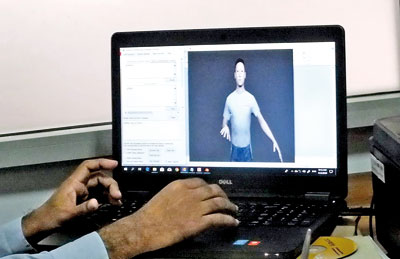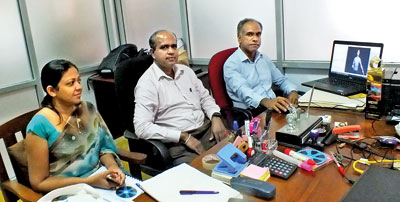Technology advancement to benefit the deaf community in Sri Lanka
The human family is a combination of the healthy and the disabled and among the disabled are different categories such as physical, mental, aural and visual. Though these handicapped persons are part and parcel of the one human family they sometimes appear to be a burden for the society.

When Sinhala words are fed to the computer the avatar figure makes signs.
Among the handicapped, when one speaks of aurally handicapped or deaf persons, according to the Sri Lanka Federation of the Deaf (www.slcfd.lk), there are over 300,000 deaf people in Sri Lanka and the WHO estimation is that around 9 per cent of the Sri Lanka population suffers from a loss of hearing.
Thus aural disability is responsible for isolating a large segment of the society who would have made a profound impact to the economic development of the country, had there been a technique for them to communicate with other segments of the society.
Prof. R. G. N. Meegama, Professor in Computer Science, Faculty of Applied Science, Sri Jayawardenapura University and Dr. Malinda Punchimudiyanse, Lecturer in Computer Science, Open University have teamed up in launching a project to assist the deaf in Sri Lanka and break through the communication barrier by formulating Sinhala to Sinhala Sign Language Translator though a human-like computer visual.
Last week, the Business Times team accompanied Dr. (Ms) Priyanwada Warakagoda, Scientific Officer, National Science Foundation (NSF) to meet the duo – Prof. Meegama and Dr. Renchimudiyanse at the Department of Computer Science, Sri Jayawardenapura Univeristy to obtain details of this unique community service project.
The NSF under its technological grants awarded the project a grant of around Rs 2.5 million. Dr. (Ms) Warakagoda said that the NSF decided to make this grant considering the tremendous importance the project would provide to the community, specially to deaf people.
Design stage
She said that the grant was awarded to design and develop a software module to recognise the Sinhala voice and convert it to Sinhala Unicode text script real time. The design includes developing a database for Unicode text to conversational/ letter mapping of sign language; develop a gesture sequencing engine to map Sinhala laymen sentences to Sinhala sign language with the support for internationalisation among other designs and developments.

From left: Dr. (Ms) Priyanwada Warakagoda, Dr. Malinda Renchimudiyanse and Prof. R.G.N. Meegama.
The project was to design a framework for real time translation of spoken Sinhala language to Sign language which is planned to achieve in three stages – voice recognitions, recognise the voice of a normal person by the computer; machine translation, recognised voice will be translated to a sign language and 3D motion capture and avatar animation, sign language gestures of the translation have to be accurately ordered and displayed using a 3D avatar to an aurally handicapped user.
Prof. Meegama said that people tend to look at a deaf person with sympathy rather than with dignity respect and equality. He indicated that Sinhala Sign Language (SSL) is the main form of communication for the deaf and asserted that since all healthy people are not conversant with SSL, a deaf person, who lives in Sri Lanka, is unable to get the required services efficiently from a school, hospital, bank, court, shop, public transport or from any other institution due to lack of Sinhala to SSL interpretation support.
He said that during the past two decades, advances in computer technology to improve the accessibility for aurally handicapped through electronic devices and software have been found and thus they commenced working on the project in 2014 which is to develop Sinhala to Sinhala Sign Language translation software.
The software translates Sinhala voice/Sinhala text to a group of Sinhala Sign Language (SSL) gestures via 3D virtual human (3D avatar) appearing on a computer. It has the capability of signing a regular Sinhala sentence like “mother goes home” using 300+ SSL signs. All other unknown words, such as names, are signed using character-by-character 61+ fingerspelling alphabet, which is synonymous to the Sinhala alphabet.
Moreover, he said the software can translate numbers and basic mathematical equations into SSL. Along with the capability of adding new SSL signs within minutes, the software is also capable of translating some Sinhala grammatical notions to SSL.
Visited special schools
To complete their project, the two lecturers visited Balangoda Yashodhara Special School, Deaf School, Ratmalana and Rohana Special School, Matara and also obtained the assistance of many resource persons to fulfill their task.
The benefits of the project can be reaped through several ways, Prof. Meegoda pointed out. Primarily, teachers of special schools and special education units of regular schools can use the software to train SSL to the deaf schoolchildren and conduct SSL examinations using the software.
Parents of a deaf child could use the software at home to train SSL to kids as well as themselves. Institutions may customise this software to express their business functions to the deaf community and he said that moreover, public and academia may use the software to translate prepared speeches, prepared lectures, spontaneous day-to-day communications and notices to SSL. Thus, the benefit to the society offered by the project is clearly evident.
He said that their next stage of the venture is to bring in more improvements to what they have already achieved and most essentially that they would focus on initiating a similar project in Tamil.
He urged the media to publicise and popularise their work which would immensely benefit the aurally handicapped Sri Lankans.
His telephone number is 071 8388055 and the email address is rgn@sci.sjp.ac.lk


